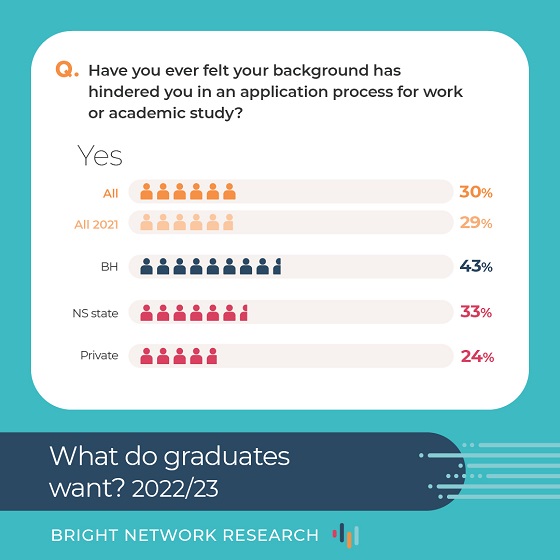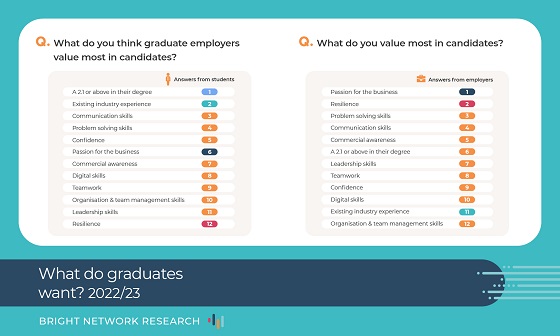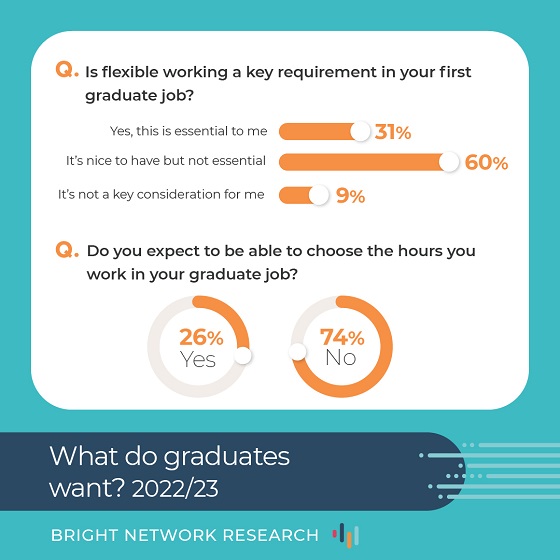Research by Bright Network reveals what graduates want from their first jobs, Ben Triggs explains how employers can take the initiative.
Bright Network’s annual research What do graduates want? 2022/23 includes the thoughts of over 14,000 students and recent graduates across 159 UK universities, making it one of the most important graduate careers reports in the UK.
Packed full of findings and actions for employers, we share three core trends.
Social mobility challenges
There are so many data points needed to fully explore social mobility, but if we just look at the difference between university students who attended non-selective state schools and those who attended private schools there are some telling trends.
Only 41% of state educated students think they will secure a graduate role versus 60% of their peers who attended a private school. State school students also say that they feel less prepared for the world of work (46% vs 57% of private school students), a gap that has increased by 8% since last year.
Employers need to be aware of this and there are key changes they can make to support all candidates.
Firstly, privately educated students are much more likely to gain a formal internship, whereas those from a state school are more likely to do part-time work during university terms. Employers need to ensure they are assessing transferable skills gained from all types of experience, not just impressed by industry experience which could have been gained through connections.

Secondly, employers need to offer support to graduates allowing everyone to put their best foot forward in an application. The majority (95%) want to be upskilled directly by employers and this includes skills workshops throughout university and coaching within the process.
Our social mobility whitepaper covers this in more depth with more actions.
Students misunderstand what employers want
If you look at the table below, you’ll see what students think employers are looking for (on the left) and then what employers are looking for – taken from a survey of 100 leading graduate employers.
You can see that vast differences emerge, highlighting the need for employers to do more to increase awareness of what they are actually looking for amongst their applicants.

There are two key areas to note:
Resilience – this is now essential for employers, ranking it second out of the 12 attributes or skills. However, students don’t believe that employers are looking for it. This can cause two problems. Firstly, students don’t work on their resilience – it can be worked on through students proactively going outside of their comfort zone and also reflecting on previous experiences to encourage growth. Secondly, where graduates aren’t preparing to give examples of instances where they have displayed resilience, they may be at a disadvantage to show employers that they possess the skill at all.
Existing industry experience / 2.1 or above – students still believe that these are a gateway into graduate level employment after university, but this isn’t the case for employers. Applicants are self-selecting out of processes if they don’t feel confident about their experience or qualifications, with employers missing out on brilliant candidates.
In both examples, there needs to be an education piece surrounding what you’re actually looking for, empowering great students with the confidence they need to pursue applications with you. Also, supplementing this with skills/coaching sessions to actually help them improve these skills. It’s one thing knowing what employers are looking for, it’s another actually demonstrating it.
Graduates want flexible working
As pandemic restrictions are lifted in England, a key question for all HR teams has been deciding the right balance of flexibility and remote working for their organisations.
It’s one that requires a lot of thought and graduates should be part of this thinking. Graduates are new to the working world and need to be constantly learning in formal and informal settings. In many ways the office is better for this.
Our research shows that graduates are looking for flexibility and remote working in their roles. The majority (91%) said they are keen to have some flexibility and four in five expect at least some of their role to be remote.

To highlight this desire further, when asked whether they should be able to pick their own hours in their first job, one in four said yes. Whilst this will be unrealistic in almost all careers, it does present a change in attitude as we move out of the pandemic.
The key action here isn’t to give complete flexibility, but employers need to work out what is best for them and communicate this effectively to graduates, highlighting the benefits of their policy when graduates start in the business. This also highlights a transparency which Gen Z are looking to see and will present you as a forward thinking employer of choice.


0 Comments
Trackbacks/Pingbacks